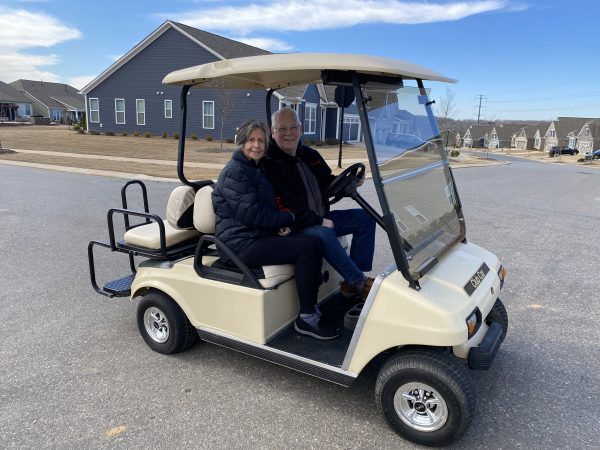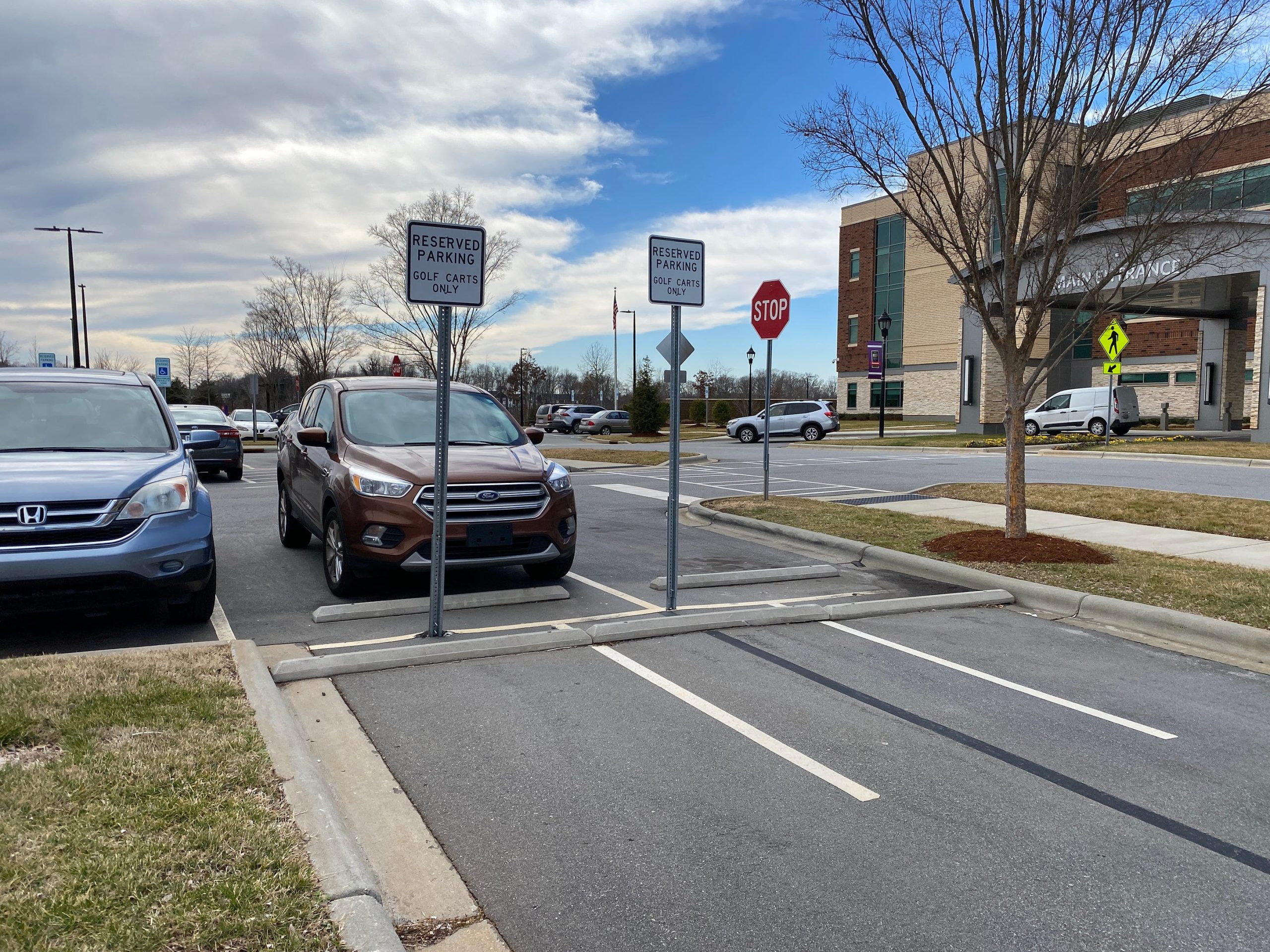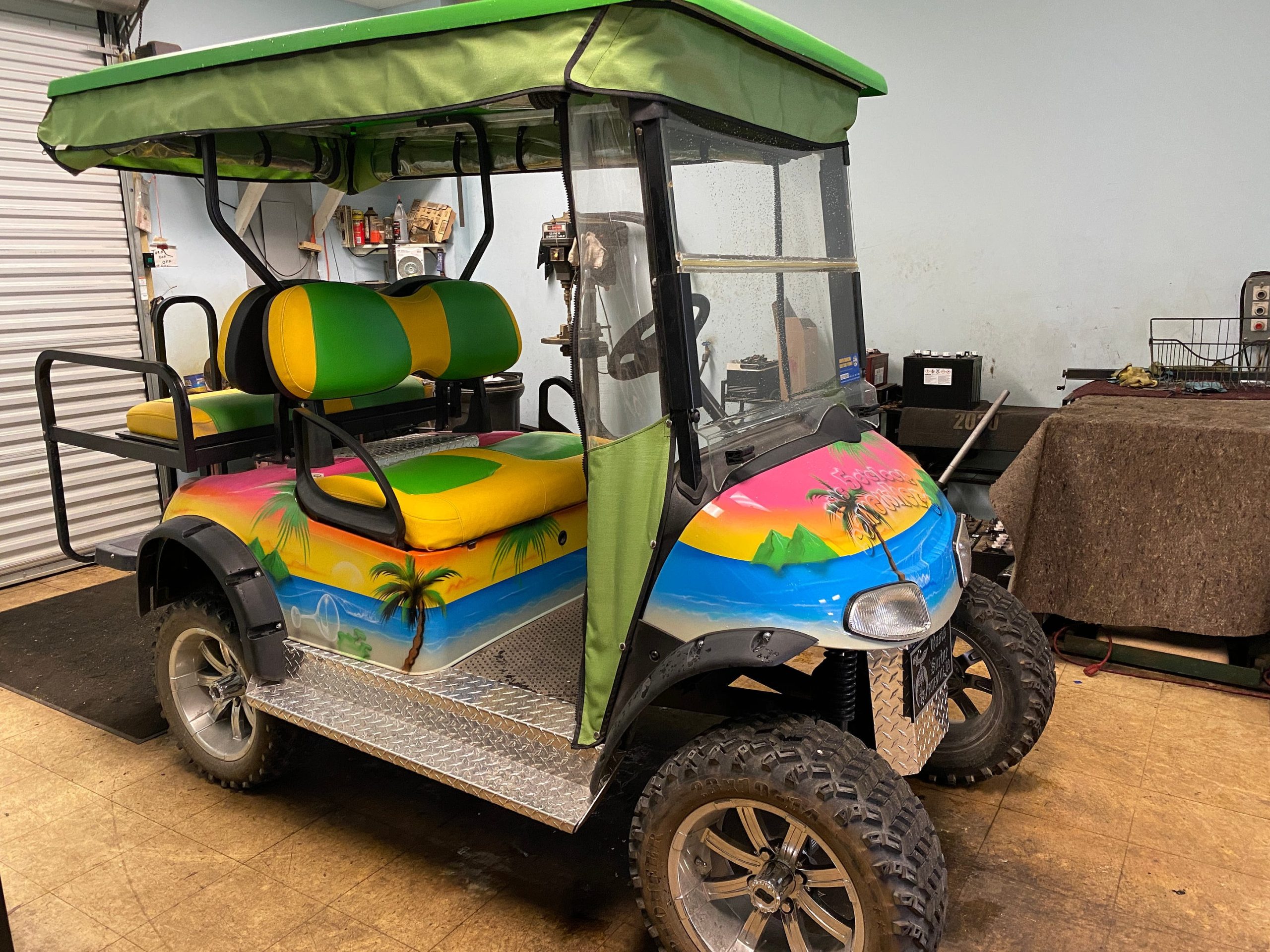Golf cart market picks up speed as transportation alternative in Charlotte region

This story was originally published in Transit Time, a newsletter jointly produced by the UNC Charlotte Urban Institute, WFAE and The Charlotte Ledger.
Mercedes and Ed Hampson moved to the Cresswind 55+ community near Mint Hill in November of 2020, and when one of their two cars kept going on the fritz, they faced a conundrum familiar to many retiree couples: We don’t often need two cars, but when we do, we do.
Ed, who’s had two organ transplants, often finds himself heading 1.5 miles to the new Novant medical complex adjacent to Cresswind for a blood test or doctor visit. Mercedes loves her Zumba classes in the community center, but it’s a bit too far for her to walk. Sometimes, the timing of their activities and appointments collide.
The transportation answer they landed on? A golf cart.
Last November, they sold their troublesome 2007 Volkswagen Passat and used the $3,000 from the sale to buy a used 4-seat golf cart from a neighbor. Ed uses it to zip at 15-20 mph to his doctor’s appointments (there are special golf cart spaces in the parking lot), and Mercedes can have the car for errands or to head to an activity. Pretty soon, they’ll be able to use the golf cart for shopping, too; a new Publix is planned for the entrance to the community and will have golf cart parking.
Sales zooming: Golf carts are becoming more of a transportation tool in Charlotte neighborhoods, both for seniors like the Hampsons and for younger families who use them to hit the neighborhood pool or to head to a cookout down the street. Some people trick out their golf carts with custom colors and graphics, big fancy tires or lift kits.
Golf cart sales spiked during Covid, and while industry experts say sales have been tempered by supply chain problems that have plagued much of manufacturing, demand is still outpacing what it was in 2019.
The golf cart market was valued at $1.34B in 2020 and is projected to reach $1.79B by 2028, according to data from Allied Market Research. Golf courses make up 55% of the golf cart market share; other big golf cart consumer groups include hotels, colleges, hospitals and cities.
Carolina Golf Cars on Wilkinson Boulevard was averaging sales of 20 to 25 carts a month in the winter before the start of Covid in 2020, but once the pandemic hit, that number exploded to 125 to 150 a month, salesman Robert Sherlin said.
“We think it’s because people had nothing to do but sit at home,” he said.
The company’s biggest months for sales are from May through August, when they typically sell 90 to 100 new or refurbished golf carts a month. Sales have come down from that 2020 Covid spike, but they’re still higher than they were before the pandemic, Sherlin said.
Pumping the brakes on sales: And they’d be selling even more if there wasn’t a supply chain problem.
Carolina Golf Cars and other golf cart retailers buy many of their vehicles from golf courses, which typically keep golf carts for just three years before selling them to a reseller that installs lights and turn signals, paints them and possibly adds new wheels and fancier seats before putting them up for sale.
A national shortage in parts means that manufacturing isn’t keeping up with demand, so golf courses aren’t turning their stock over to resellers. That means higher prices and longer waits for individuals who want to cruise around neighborhoods. Sherlin said some of his customers are putting down deposits and having to wait eight to 12 months for a vehicle.
 |
CARTING TO THE HOSPITAL: At the Novant Health Mint Hill Medical Center, there are golf cart parking spots right up front: “Reserved Parking — Golf Carts Only
New golf carts typically cost between $12,000 and $15,000, and used ones typically go for around $6,000 to $9,000. Golf carts can last for 20 years or more; the biggest maintenance issue is buying new batteries.
Towns respond: Golf carts were ideal pandemic toys, and they’ve become part of the social scene in many neighborhoods. Residents decorate them for parades during July 4th or the holidays. In the massive Sun City 55+ community in Fort Mill, residents parked them in clusters and sat and talked outside while social distancing during the pandemic.
But the uptick in golf carts has caused strife in some towns, where police have had to crack down on underage driving (you must be 16 to drive a golf cart in North and South Carolina) and in some cases violating town ordinances.
In Fort Mill, police had to remind residents last summer that golf carts were not allowed to be driven on secondary roads, and the town of Waxhaw issued warnings that it doesn’t allow golf carts on any publicly maintained streets.
Other towns have embraced them — and are cashing in on some golf cart-associated fees. The town of Belmont in Gaston County allows golf carts on most streets as long as drivers get a $25 annual registration and inspection, a $5 decal and provide proof of insurance.
Lancaster Golf Cars sits just across Lancaster Highway from Sun City, and owner Greg Haney spends each morning driving his trailer around Sun City, picking up an average of 2 to 4 golf carts from residents who ask him to install new batteries or do other maintenance.
He figures he’s sold about 1,000 golf carts to Sun City residents since the community opened in 2005.
 |
Some golf cart owners cruise around in tricked-out carts like this one that was getting new batteries last week at Lancaster Golf Cars.
“People are getting more fancy with the backseats and stuff like that,” Haney said. “There’s new things coming out all the time. Patents on seats, new hubcap styles, new rim styles.”
On a recent rainy lunchtime, Greg Haney and his son Matt and dad Sherrill were taking a break from working on a tricked-out golf cart that was in for six new batteries. Its paint job showed a bright tropical scene with the words “It’s 5’ o’clock somewhere.”
“It looks like it’s supposed to be at the beach,” Greg Haney said, “but it’s at Sun City.”
Wording note: Although most people refer to them as “golf carts,” some in the industry call them “golf cars.” Robert Sherlin of Carolina Golf Cars explains why he calls them “golf cars”:
“It’s a golf car to us. What do you do with a cart? Do you push it, or do you pull it? A car drives.”
Cristina Bolling is managing editor of The Ledger: cristina@cltledger.com
Cristina Bolling